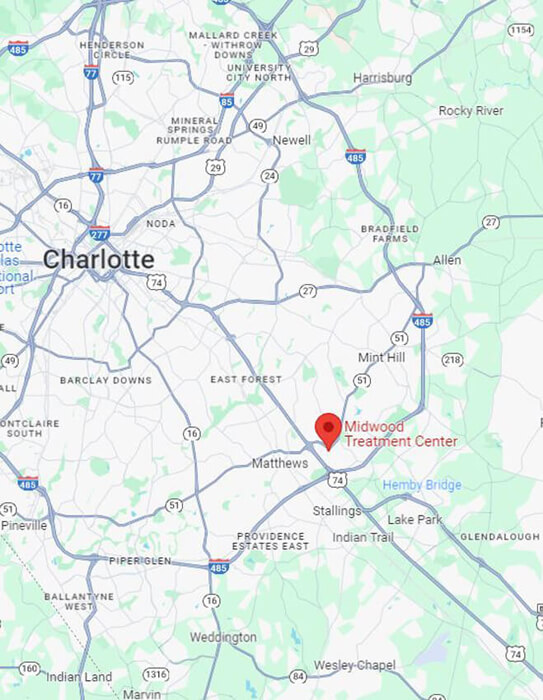Midwood Addiction Treatment and Mental Health Facility
Midwood Addiction Treatment Center offers you a comprehensive range of services to address substance use disorders and mental health conditions. Midwood Drug and Alcohol Addiction Treatment Center is part of the Harmony Health Group and maintains its standard of care. We believe that health and healing are transformative experiences that can mean the difference between lost potential and a well-lived life.
Midwood Alcohol and Drug Addiction Treatment Center is a free-standing facility in the heart of Charlotte, North Carolina. You’ll have access to clinical and medical services that address recovery and sobriety using evidence-based and holistic approaches to care. Drug and alcohol addiction is one of the leading causes of preventable illness, and the importance of treatment cannot be overstated.
Our treatment center is a free-standing building in the heart of Charlotte that is both warming and comforting and supports the recovery process.
It comprises multiple group rooms, therapist and case management offices, medical offices, and more. All of our clinical and medical services, from the point of intake and assessment to discharge, are delivered at our treatment center, just minutes away from the center of the city of Charlotte, and from our affiliated partnered supportive housing locations operated by House of Harmony, LLC.

Amenities
Warming and comforting center with all clinical and medical services delivered at our treatment center

Location
Located in the Plaza Midwood historic district on the corner of Commonwealth Ave and The Plaza, just minutes away from the center city of Charlotte

Transportation
If using the House of Harmony partnered supportive housing, transport to/from our treatment center from partnered supportive housing is provided.

Midwood Addiction Treatment Center
Contact us to schedule a free assessment.
Midwood Addiction Treatment Center Reviews and Ratings
Individuals who use Midwood Substance Addiction Treatment Center services speak highly of the individual attention, therapeutic intervention, and community they experience within the facility in the Tar Heel State. “Without the services they provided, I am sure I would have gone back to my old ways and drinking. The group therapy sessions and individual attention I received changed my life,” Bradley told us.
People come to us from all walks of life and in all stages of addiction or recovery. Some only require an outpatient program, while others, like Jeffrey, completed inpatient and outpatient programs. “Every aspect of their program is an incredible experience, and I would highly recommend anybody who is serious about a new way of life and getting clean and staying that way to attend this program,” he told us.
Our licensed mental health professionals use evidence-based behavioral health therapy, twelve-step programs, and relapse prevention strategies to help the people who trust us with their addiction recovery. “Midwood Addiction Treatment Center was a very positive and beneficial experience for me,” Drew told us. “It helped me focus on being present and to let go of the negativity of certain things in the past. It provided me with the skills to set a solid foundation for the life ahead of me.”

Rehab Center in North Carolina That Accepts Insurance
Midwood Addiction Treatment Center in Charlotte, North Carolina, offers specialized programs that cater to patients dealing with substance abuse. Our comprehensive services include a partial hospitalization program (PHP), intensive outpatient program (IOP), medication-assisted treatment (MAT), and general outpatient services.
At Midwood Substance Addiction Treatment Center, we are dedicated to offering personalized addiction care to support patients at various stages in the recovery journey. We currently accept new patients if you or a loved one seek help. Taking the first step towards sobriety and recovery is crucial, and our experienced team is here to guide you through the rehab admissions process.
Whether you prefer to call or contact us online, we encourage you to reach out. Starting your recovery journey with Midwood means embarking on a path toward healing and positive change. Let us assist you in taking that important first step towards a healthier, substance-free life.
Midwood Addiction Treatment Center
3057 Senna Drive
Matthews, NC 28105
Phone: 888-399-7556
Website: Midwood Drug and Alcohol Addiction Treatment Center
Rehab Treatment Programs at Our Charlotte, North Carolina Center
The type of rehabilitation treatment programs offered at alcohol and drug addiction centers can vary. The following is a list of examples offered at Midwood Drug and Alcohol Addiction Treatment Center. However, these are just examples and not a full list. For more information about our evidence-based addiction therapies and holistic addiction recovery programs, call Midwood Addiction Treatment Center.
Medication-Assisted Treatment (MAT)
Medication-assisted treatment utilizes medications in combination with behavioral therapies to treat substance use disorders and addictions. For those who are going through detoxification, medication-assisted treatment can reduce the potential for life-threatening side effects, as well as improve the potential for an individual to remain sober.
Substance Abuse Intensive Outpatient
Midwood Drug and alcohol addiction treatment Center utilizes an intensive outpatient program designed specifically for those who are addicted to substances. Treatment protocols include addiction recovery support groups, behavioral therapies, and psychoeducational programs for addiction to help prevent relapse and promote sustainable recovery. An intensive outpatient program offers you the therapeutic intervention you need in the least restrictive environment possible.
Substance Abuse Partial Hospitalization (Day Treatment)
Midwood Alcohol and Drug Addiction Treatment Center offers partial hospitalization programs (PHP) for substance abuse that operate five days each week throughout the day, offering you the opportunity to get the help you need while being able to go home in the evening. PHPs include addiction counseling services, twelve-step programs, and relapse prevention strategies to promote sustainable recovery.
Outpatient / Aftercare
Midwood Substance Addiction Treatment Center also offers outpatient and aftercare programs for individuals who have graduated from a structured outpatient program. Aftercare is critical for addiction recovery by providing ongoing services, including twelve-step programs and addiction recovery support groups.
Mental Health Intensive Outpatient
Intensive outpatient programs are available for those with mental health conditions to offer treatment when once-a-week therapy is not enough. Intensive outpatient mental health programs operate several days each week for several hours each day. Customized programs can typically be flexible so you can continue working or going to school.
Mental Health Partial Hospitalization
Partial hospitalization programs for mental health conditions offer treatment five days a week throughout each day to give you the help you need but still allow you to return home at night. The comprehensive level of care at Midwood Addiction Treatment Center in North Carolina ensures that you receive the mental health treatment you need when you need it.
Common Substance Use Disorders Treated at Our North Carolina Facility
There are several types of substance use disorders, including single use or multiple use. The following are examples of the rehabilitation programs offered at Midwood Addiction Treatment Center in Charlotte, North Carolina. However, these are only examples and are not a full list. Please note that our licensed mental health professionals are adept at treating individuals who are simultaneously addicted to two or more substances.
Rehab for Alcohol Use Disorder
Rehab for Benzodiazepine Use Disorder
Rehab for Cocaine Use Disorder
Rehab for Heroin Addiction
Rehab for Opioid Use Disorder
Rehab for Methamphetamine Use Disorder

Our Therapy Programs in Charlotte, North Carolina
The highly structured outpatient therapy programs at Midwood Substance Addiction Treatment Center offer individuals the opportunity to engage in behavioral therapies and experiential therapies that promote recovery and healing. Below is a list of examples, but it is not a full list of offered therapy programs.
Psychiatry Treatment
Psychiatrists are physicians who have completed an MD or a DO and continue their education and mental health. They offer a variety of forms of talk therapy and psychosocial interventions. As physicians, psychiatrists can prescribe medications or other treatments depending on your needs.
Cognitive Behavioral Therapy (CBT)
Cognitive behavioral therapy is a form of short-term talk therapy or behavioral therapy. It is an evidence-based approach to substance abuse and co-occurring mental health disorders. Alongside a trained therapist, you challenge your negative thinking patterns and learn how your thoughts control your emotions and behaviors.
Motivational Interviewing (MI)
Motivational interviewing is an approach to talk therapy that directs the conversation using open-ended questions so the individual can explore their experiences, ideas, and perspectives. It’s a collaboration between the therapist and the individual that theorizes the client has the strength and ability to change, even when past attempts have failed.
Dialectical Behavior Therapy (DBT)
This unique type of talk therapy helps people cope with their emotions and behaviors associated with substance abuse. This therapy is effective in co-occurring mental health disorders and helps people to develop skills to fight off cravings and cope with uncomfortable emotions. DBT helps individuals who struggle with emotional regulation, feelings of hopelessness, and difficult relationships.
Transcranial Magnetic Stimulation (TMS) Therapy
Transcranial magnetic stimulation (TMS) therapy applies magnetic pulses to areas of the brain that control mood. These pulses help create stronger neurological connections and improve neurostimulation so the brain can function appropriately. TMS therapy is not appropriate for everyone since it uses electromagnetic pulses. For example, individuals with implanted metal or those with a seizure disorder are not good candidates.
Eye Movement Desensitization and Reprocessing (EMDR) Therapy
EMDR is an emerging therapy that is gaining awareness for effectively treating those who have experienced trauma. This evidence-based approach uses specific eye movements while the individual focuses on emotionally charged memories. It is also effective in a variety of other conditions, including substance abuse, anxiety, depression, and panic attacks.
Mindfulness-Based Relapse Prevention (MBRP) Therapy
This therapeutic intervention integrates mindfulness meditation with traditional relapse prevention techniques. Individuals learn coping strategies while integrating mindfulness practice. This evidence-based approach has proved effective in substance use disorders, including reducing cravings and improving mental health conditions such as anxiety and depression.
Yoga, Meditation and Relaxation Therapy
These experiential therapies help your mind focus on your physical, emotional, and mental health by using movements, relaxation, and breathing exercises, which help the body and mind to relax while reducing stress. These therapeutic interventions can be used during times of high stress in an individual’s life and to improve relaxation before talk therapy.
Activity-Based and Adventure Therapy
Adventure therapy is activity-based or experiential therapy that incorporates challenging activities to promote healthy identity development. Activities could include camping, rock climbing, or mountain biking, supervised by mental health professionals. Long-term residential camping is another type of adventure therapy that helps individuals confront issues in day-to-day living.
12-Step and Non-12-Step Programs
Midwood Addiction Treatment Center offers 12-step and non-12-step structured addiction recovery support groups. Groups are typically structured and help individuals recover in a group environment. This allows individuals to receive support from others, addiction counseling services, and recovery-oriented therapy.
Music and Art Therapy
Music and art therapy are evidence-based, effective treatment modalities for mental health disorders. It is an experiential therapy that allows individuals to explore their emotions and thoughts while creating art or making music. This allows another form of expression where individuals can interact with the environment and themselves without speaking.
Therapy and Wellness Education
Therapy and wellness education uses a therapeutic approach to support the entire person, including their emotional, physical, personal, and intellectual factors. Individuals learn how to address factors that influence their wellness. Working with a therapist, an individual begins to understand how their decisions impact their physical, emotional, and intellectual health.
Can Couples Go to Rehab Together?
Mental health disorders and substance addiction do not typically occur in a vacuum. Couples and families can go to rehabilitation together. In some circumstances, couple therapy can increase motivation; in others, it can help couples set healthy boundaries with their significant other.
Couples can choose to go through addiction recovery together on an inpatient or outpatient basis. Family therapy is also available to help families adjust to the guilt and grief that often accompanies a substance use disorder. Family therapy allows individuals to express their emotions in a safe and structured environment.
Do Rehab Centers Allow Cell Phones?
Midwood Drug and Alcohol Addiction Treatment Center allows individuals to bring cell phones. It is crucial to remain present, whether individual, group, or family, during your therapy sessions. While cell phones are allowed on the premises, individuals are discouraged from using them during therapy.
Cell phones can help you feel more connected to your friends and family while you’re at Midwood Alcohol and Drug Addiction Treatment Center. They can also offer a form of distraction between therapy sessions. However, as with anything else, the more you put into your addiction recovery support groups and outpatient addiction treatment, the more you’ll get out of it.
Do Rehabs Allow Wi-Fi Internet?
Midwood Drug and Alcohol Addiction Treatment Center has Wi-Fi internet for individuals receiving treatment in our Charlotte, North Carolina, treatment center. A common reason for dropping out of recovery is a lack of social support. Wi-Fi lets you stay in touch with your friends and family outside the treatment center.
Midwood Addiction Treatment Center in Charlotte, North Carolina, does have specific rules that must be followed for cell phone and computer use on the Wi-Fi connection. You’ll learn more about those during your orientation.
However, we understand that staying connected provides emotional support and directly increases the benefits of your treatment.
Do Rehab Centers Allow Visitors?
Rehabilitation centers will have their own rules about visitation from friends and family. At Midwood Addiction Treatment Center in North Carolina, we encourage your friends and family to visit during visiting hours. We prefer that visits do not interfere with your therapy sessions and insist that your friends and family never bring drugs or alcohol to the facility.
The mental health professionals at Midwood Substance Addiction Treatment Center understand the significant benefits to recovery that your family and friends provide. If you have questions about visitors, what they can bring, and when they can come, contact Midwood Addiction Treatment Center today at (888) 399-7556 or contact us online.
Can You Get Fired for Going to Rehab?
When you consider entering rehabilitation for addiction, you may be concerned about whether you’re putting your job in jeopardy. The Family and Medical Leave Act and the Americans with Disabilities Act are federal laws that protect against being fired for seeking rehab for substance abuse or an alcohol use disorder.
It is also important to remember that all treatment provided at Midwood Addiction Treatment Center is private and confidential. You may be fired from your job if an addiction interferes with your ability to do your work. The federal laws do not cover individuals who are currently using drugs but can help protect you if you’re seeking treatment.
Can a Pregnant Woman Go to Rehab?
Yes, pregnant women can go to rehabilitation. This helps protect their health and the health of their unborn child. However, there are unique medical requirements for pregnant women. If you are pregnant and are seeking recovery at Midwood Addiction Treatment Center, we encourage you to call today for more information.
We’ll give you more information about the medical and psychological care you need. Pregnant women must complete additional steps, including a thorough medical evaluation and obstetrician clearance, to ensure that recovery protects their health. If you are pregnant and seeking addiction care, contact Midwood Drug and Alcohol Addiction Treatment Center today at (888) 399-7556 or contact us online for more information about how we can help.
Contact Midwood Addiction Treatment Center
Consult our compassionate experts to help you find a roadmap to addiction recovery.